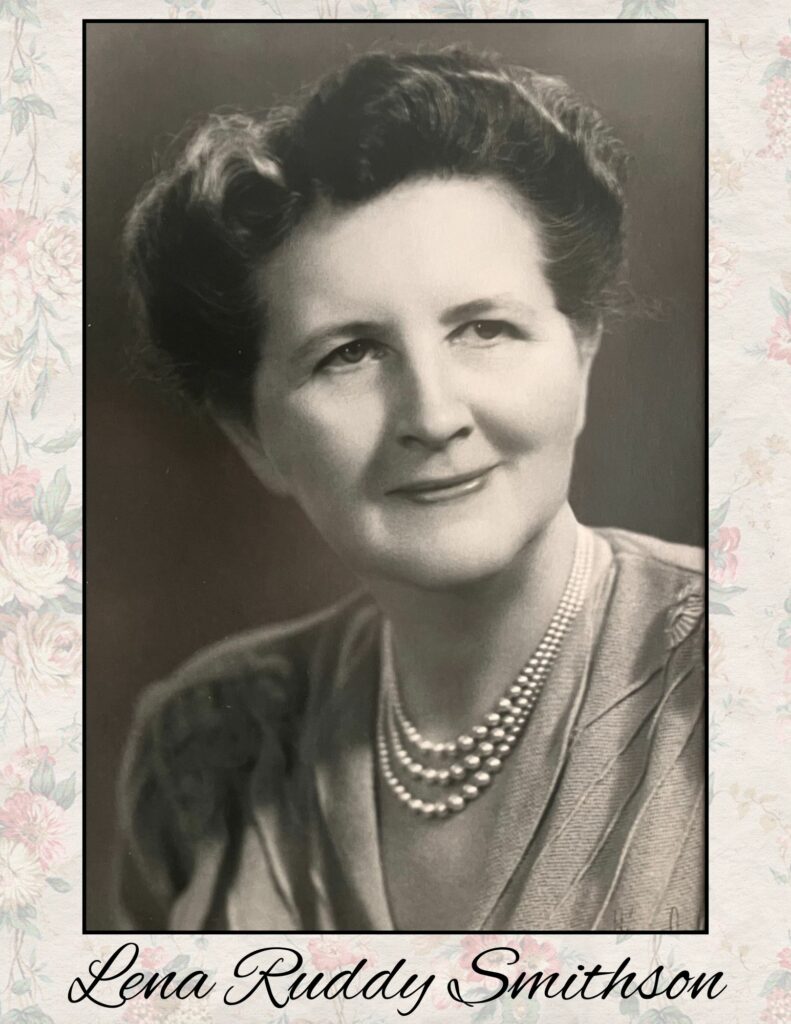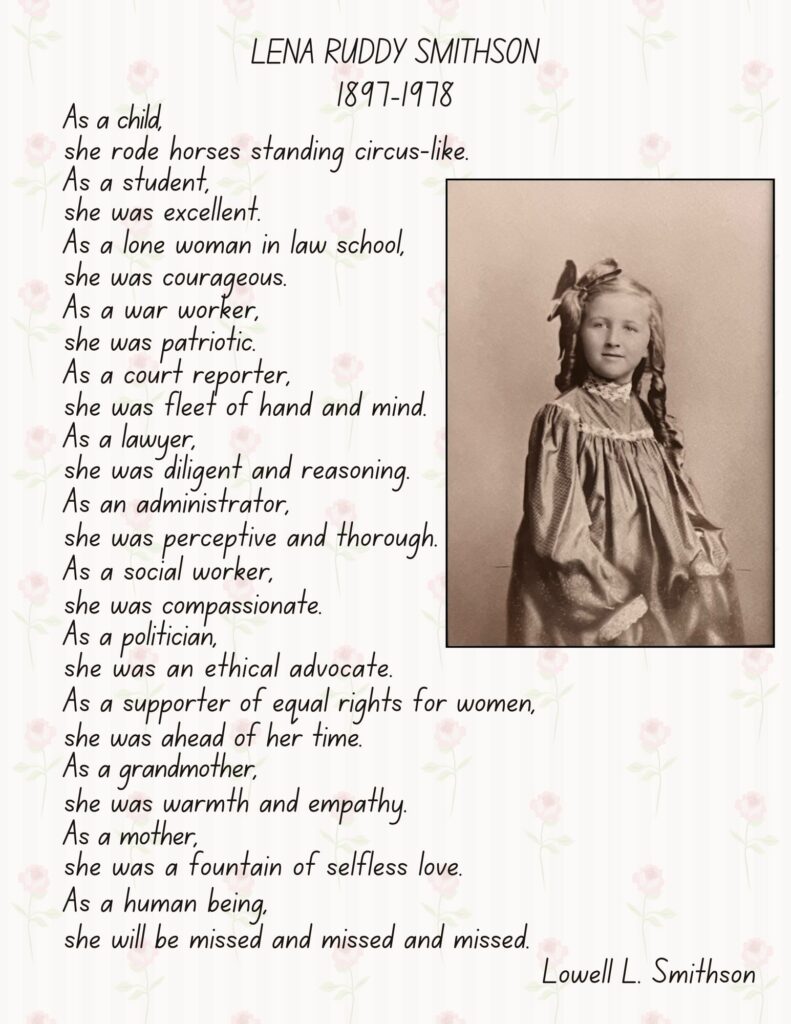Smithson Room History


Lowell Smithson provided funds for the establishment of the Ruddy-Smithson room in honor of his mother, Lena Smithson. This enabled the room to be furnished and books purchased that were devoted to the subject of women’s studies. Members of the A. A. U. W. provided the labor to decorate the room.
Ruddy-Smithson Room
Mr. Lowell Smithson donated $2,234.00 to the Library to renovate a room on the second floor of the library in memory of his mother, Lena Ruddy Smithson. The room holds a collection of books that focus on the women’s movement, a concern of Mrs. Smithson’s for many years.
Mr. Smithson also donated a poster from the First National Women’s Conference signed by seventeen famous people at the conference. The poster cost $1000; the proceeds went to support the ERA Movement.
Work on the room began with the removal of a wall. Two tiny rooms became a larger one; it now comfortably holds 15 people. A cedar beam replaced the wall.
A painting crew pitched in next. Lena Bowen, a Library Trustee, Lilliam DesMarias, Sandra Goers, Janet Hartline, Mildred Cole, and Judith Shoot spent several Saturdays painting ceilings, walls, windows, and trim. Sandra Goers stripped and refinished the solid wood doors. Judith Shoot made curtains from a plain blue fabric.
Bookshelves, tables, chairs, and carpet were ordered. Lacking a few finishing details the room was already in use in the early spring of 1981.
The public may schedule the room for use anytime during regular library hours.
LENA RUDDY SMITHSON – A HISTORY
She was born July 24, 1897, in Chillicothe and was the fourth of five children. Her mother, Katherine Ann Jourdan of Kentucky, died when she was about six years old, and her mom’s sister (Aunt Liz) came to live with them to keep the family administered. Lena’s father ran a large grocery and meat market in Chillicothe and was well respected. He was known as “Will” Ruddy. As a young girl she loved riding horses-standing circus-like on their backs. She was also a serious student.
She was valedictorian of her high school class. Will Ruddy rented a house in Columbia, Missouri, and sent Aunt Liz and Lena and Lena’s other college-age siblings there to get a degree from the University of Missouri (the only University of Missouri) then.
Lena started in arts and science and finished in her freshman class winning the Roades Clay Freshman Scholarship. She could enter Law School there without first having a bachelor’s degree (as I did there in 1951)- so she did (after a couple of years in arts and science) for one year and was then the only woman in that law school. She used to tell of a then-famous laws professor named Manley O. Hudson.
She finished her first year in law near or shortly after the entry of the US into WWI in 1917; and then she and Isabelle went to Washington, D.C. to do war work. A Missourian (known to Democrat Will Ruddy) was high up in the Washington agency until the war was over. They both worked for women’s suffrage, which President Wilson supported; and the Nineteenth Amendment finally passed in 1920 giving women the right to vote.
After the war, Lena moved to Kansas City to attend the Kansas City School of Law- a precursor to Kansas City University’s Law School, and the University of Missouri at Kansas City’s Law School where I taught antitrust law in 1982. She studied law there, I believe, for about a year and a half, and a tall and distinguished instructor there was V.E. Phillips, then also a practicing lawyer. In those days one did not have to have a law degree to take the bar exam, so Lena brushed up, took the bar and passed in 1922. She liked and respected V.E. “high pockets” Phillips. She again was the only woman in her class.
Following her passing the bar, she went to work in the law offices of Rudy D. Garrett. He had been a bird colonel in the Rainbow Division in France division commanded by Gen. Douglas MacArthur was of WWII fame and had returned to practice in Kansas City. He was a Unitarian and both Lena and her trial lawyer husband-to-be, Spurgeon L. Smithson, knew him. The only law Lena could practice in the early ’20s was domestic relations law – the prejudice and discrimination against women then being so strong that general practice was not available to women. She learned she did not like practicing domestic relations law. Thus, she only practiced it for about 2 years. She married Spurgeon in 1924.
Next, she moved to become an official court reporter in Trial Division 4 of the Circuit Court of Jackson County, Missouri, at Kansas City. The Trial Judge for whom she worked for some years was Brown Harris. She knew Gregg Shorthand and took down testimony and the judge and trial lawyer talk with her fleet pen. I recall in the mid-1930s (my age circa 5 or 6) seeing at home in the study at her desk stacks of thin paper that were described to me with one word as “testimony.” I knew it had something to do with court business, and that was about it.
Lena then returned to Kansas City University and got her Bachelor’s Degree in Economics in about 1940. She was divorced and moved to Chillicothe in 1941 and became Dean of Women at the Chillicothe Business College for much of World War II. In 1945, Democratic Governor Phil Donnelly of Missouri appointed Lena as superintendent of the Girls’ Training School. The Attorney General of Missouri was Buck Taylor, a Chillicothe resident and Democrat who knew Lena and the entire Ruddy clan. She held the Superintendent position for 5 years, using her legal background to deal at appropriation times with the Missouri Legislature, to interpret the provisions of court judgments for the 200 or so inmates, and to contract for goods and services to run the institution.
Following her five years of duty at the Missouri Training School, she decided to try for the same job in Oregon. Oregon had a merit system for employment, and she and a couple of other women were finalists. She was interviewed by the then governor of Oregon – and in short, got the job. The Oregon reformatory was in Salem, Oregon, and was called Hillcrest School for Girls. She held that post from about 1950 until sometime in 1954. She used her legal background in Oregon the same way she used it in Missouri. She finally left this post in Oregon because she wanted to help the girls more directly and psychologically.
She went to Tulane University in New Orleans to get a Master’s Degree in Psychiatric Social Work (an MSW) which she earned after about 1.5 or 2 years of study. I was in Korea “sightseeing” at the time.
The story goes on about her service as a psychiatric social worker at the State Mental Hospital in St. Joseph, Missouri, and then on to the Kansas Training School for Girls in Beloit, Kansas, where she served as Director of Social Work and worked closely with an in-house psychiatrist at that institution (Kansas had gotten progressive). She retired at age 66.
She then moved back to Chillicothe where she used her legal background to become Livingston County Democratic Chairperson for several years and was asked to run for Mayor of Chillicothe, which she declined. She was an active supporter of the Equal Rights Amendment for women. Through all this, she managed to be a loving mother and grandmother much loved in return. Her granddaughters, Carol and Lee, recall her cherries jubilee, fudge, plum pudding, multi-tiered tins of homemade cookies, and her hugs. She passed away in 1978.
Lowell L. Smithson, her loving son
December 29, 2008

